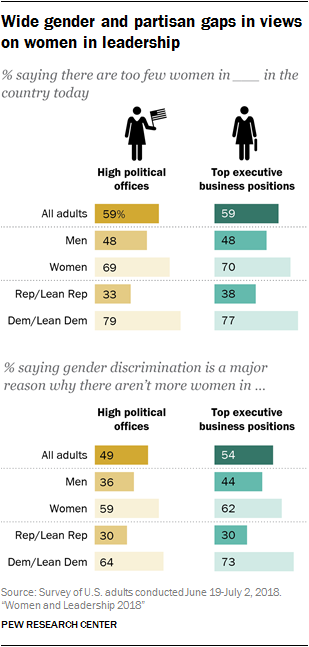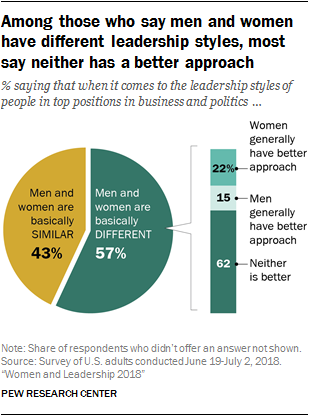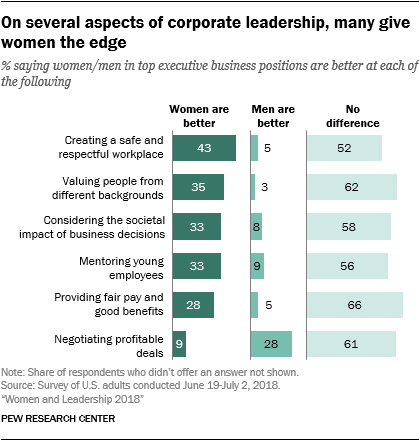Wide gender and party gaps in views about the state of female leadership and the obstacles women face
 Two years after Hillary Clinton became the first woman to win the presidential nomination of a major U.S. political party, and with a record number of women running for Congress in 2018, a majority of Americans say they would like to see more women in top leadership positions – not only in politics, but also in the corporate world – according to a new Pew Research Center survey. But most say men still have an easier path to the top and that women have to do more to prove their worth. And the public is skeptical that the country will ever achieve gender parity in politics or in business.
Two years after Hillary Clinton became the first woman to win the presidential nomination of a major U.S. political party, and with a record number of women running for Congress in 2018, a majority of Americans say they would like to see more women in top leadership positions – not only in politics, but also in the corporate world – according to a new Pew Research Center survey. But most say men still have an easier path to the top and that women have to do more to prove their worth. And the public is skeptical that the country will ever achieve gender parity in politics or in business.
Republicans and Democrats have widely different views about where things stand today and what factors are holding women back. Democrats and Democratic-leaning independents are more than twice as likely as Republicans and those who lean Republican to say there are too few women in high political offices (79% vs. 33%). And while 64% of Democrats say gender discrimination is a major reason why women are underrepresented in these positions, only 30% of Republicans agree.
There are also wide gender gaps in views about women in leadership. About seven-in-ten women say there are too few women in high political offices and in top executive business positions; about half of men say the same. And women are far more likely than men to see structural barriers and uneven expectations holding women back from these positions. About seven-in-ten women – vs. about half of men – say a major reason why women are underrepresented in top positions in politics and business is that they have to do more to prove themselves. And while about six-in-ten women say gender discrimination is a major obstacle to female leadership in each of these realms, smaller shares of men say this is the case in the corporate world (44%) or in politics (36%).
To a large degree, these gender gaps persist within parties. Among Republicans and Democrats, women are more likely than men to say there are too few women in political and corporate leadership positions, and there are substantial gender differences, particularly among Republicans, in views on the obstacles holding women back from these positions.
Despite the surge of female candidates this year, women are increasingly doubtful that voters are ready to elect more female leaders. A growing share cite this as a major reason why women are underrepresented in high political offices: 57% of women now say voters not being ready to elect women is a major reason, compared with 41% in 2014. Men remain much less likely to see this as a major impediment (32% of men do so).
 The survey also finds that Americans largely see men and women as equally capable when it comes to some key qualities and behaviors that are essential for leadership, even as a majority (57%) say men and women in top positions in business and politics tend to have different leadership styles. Among those who say men and women approach leadership differently, 62% say neither is better, while 22% say women generally have the better approach and 15% say men do.
The survey also finds that Americans largely see men and women as equally capable when it comes to some key qualities and behaviors that are essential for leadership, even as a majority (57%) say men and women in top positions in business and politics tend to have different leadership styles. Among those who say men and women approach leadership differently, 62% say neither is better, while 22% say women generally have the better approach and 15% say men do.
Still, there are areas where the public sees female leaders as having an advantage. In both business and politics, majorities say women are better than men when it comes to being compassionate and empathetic, and substantial shares say women are better at working out compromises and standing up for what they believe in. Similarly, more adults say female political leaders do a better job of serving as role models for children (41%) and maintaining a tone of civility and respect (34%) than say the same about men. In each of these cases, only about one-in-ten or fewer give men the advantage. Male leaders are seen as better than their female counterparts when it comes to willingness to take risks; about four-in-ten say men in top executive positions and in high political offices are better than women in this regard.
 Looking specifically at corporate leadership, 43% say women are better at creating a safe and respectful workplace; 52% say there is no difference, while just 5% say men are better at this. And while majorities say there is no difference between male and female leaders when it comes to valuing people from different backgrounds, considering the impact of business decisions on society, providing guidance and mentorship to young employees, and providing fair pay and good benefits, those who do see a difference tend to give women the advantage.
Looking specifically at corporate leadership, 43% say women are better at creating a safe and respectful workplace; 52% say there is no difference, while just 5% say men are better at this. And while majorities say there is no difference between male and female leaders when it comes to valuing people from different backgrounds, considering the impact of business decisions on society, providing guidance and mentorship to young employees, and providing fair pay and good benefits, those who do see a difference tend to give women the advantage.
Overall, the public sees benefits to female leadership. Majorities say having more women in top positions in business and government would improve the quality of life at least somewhat for all Americans (69%) and for women (77%) and men (57%) specifically. Women are far more likely than men to say having more women in top leadership positions would be beneficial. Two-thirds of women say having more female leaders would improve the quality of life for men at least somewhat, compared with 47% of men. And while majorities in both groups say this would improve the quality of life for all Americans, women are far more likely than men to say this is the case (78% vs. 59%).